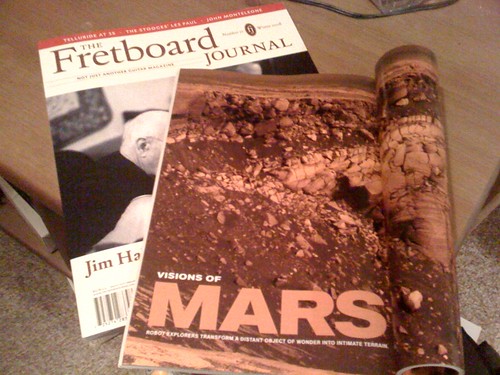
This is a report on my books: they are sitting in a large pile that I anticipate getting larger within the next few days as some Tintin comics travel from somewhere, here. The stack includes, among others: a travel book on Scotland; The Tempest; Kingsley Amis’, Lucky Jim (no idea why that is taking so long); Slaugtherhouse Five (Homer Simpson has a brilliant interpretation of this, yes?); Thompson’s, Blankets; The Adventures of Tintin: The Black Island; and Chabon’s, The Yiddish Policeman’s Union. Really I cannot get enough: I need more. Letters to the editor, blogs, instruction sheets, liner notes, and, not lastly, magazines.
The episodic nature of magazine is one of the most compelling and satisfying things about them. Formatted, yes, but each issue has an identity: a new gamble at a satisfying meal. Right? I straddled the recent annual odometer change with two publications that cemented a beautiful year gone and offered particularly inspired direction toward the future.
The cover story of Fretboard Journal (Winter 2008) is Bill Frisell’s interview of Jim Hall. Brief introduction if necessary: Frisell is an exquisite musician and a student of Jim Hall, whose commensurate talents were shifted back in time so as to influence directly and indirectly students of guitar. The cover story itself is a nearly perfect example of the successful transfer of knowledge with the serendipitous effect of broadening the pools in which everyone swims, rather than diminishing a single source of food. Within that piece is a lovely detailing by Jason Verlinde on Gary Larson’s experience as Jim Hall’s student. Larson, creator of the quintessential single-frame comic, The Far Side, is an excellent player, and as Verlinde conveys, also a fine synthesizer of jazz. What are the odds of Larson being a guitarist capable of playing with Hall and Frisell? Evidently about the same as Woody Allen being a professional clarinetist.
Last month’s issue of National Geographic included the eerily beautiful glimpses of Mars conveyed from the Rovers and friends. John Updike authored this piece. John Updike. John Updike. He proffered a tantalizing historical account of the Mars exploration and spun it his own way to make it the fact people take conversationally. William Buckley (R.I.P.) once responded to the suggestion that he was master of words with the following paraphrase: “you know who has a good vocabulary? John Updike.” (I think that this was on the Charlie Rose Show, though I cannot recall exactly.) I would like to imagine a similar moment in history where Bo Jackson and Michael Jordan sat down to talk about who was better at playing baseball. The idea that John Updike can, not only, be an authority on astronomical proceedings, but can also shrug perceptions of expertise to deliver the goods is nothing short of amazing. This is the future and it is being offered by the past.
My thoughts upon finishing these two pieces drifted to the state of design, the state of the world, and the states of America, in particular. In one regard, it was reassuring to read of music being an unowned resource from which anyone can draw, both in difficult and easy times. More contextually, I felt validated by the power of shunning expectations in favor of charging forward in embrace and defiance of challenge. The people I know and those I know who will change their worlds can speak as easily with drawings as with songs, with bridges as with glances. It is a delightful club that can delightfully, by example, include everyone.



No comments:
Post a Comment